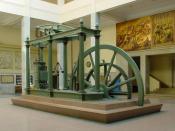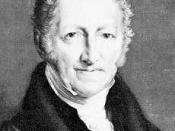By the 1800s, the Industrial Revolution was well underway in Great Britain touching all sectors of the British economy. More people moved to the cities to work in the factories while less and less were left in rural areas to farm. With this came the evils of industrial society: low wages, bad living and working conditions, overcrowding, pollution and poverty. At the same time many other new inventions were appearing, such as the steam engine. Because of the industrial revolution, the market grew rapidly, bringing about radical changes in the British economy. It was in this period Thomas Malthus and David Ricardo wrote their distinguished works on neoclassical economics.
Thomas Malthus was born in Surrey, England in 1766. He received his education at Jesus College where he excelled in mathematics. After completing his studies, be became an Anglican Cleric and was quickly promoted to curate of the parish of Albury.
Malthus's most famous work was called "An Essay on the Principle of Population." His central argument in this work was that populations increase faster than the food supply increases, which ultimately results in a shortage of food. He said, "Population, when unchecked, increases in a geometrical ratio. Subsistence only increases in an arithmetical ratio. A slight acquaintance with numbers will show the immensity of the first power compared second." He also argued that the number of laborers exceeded the amount of work in the market, which led to the low wages that were being observed in the 1800s as a result of the Industrial Revolution.


